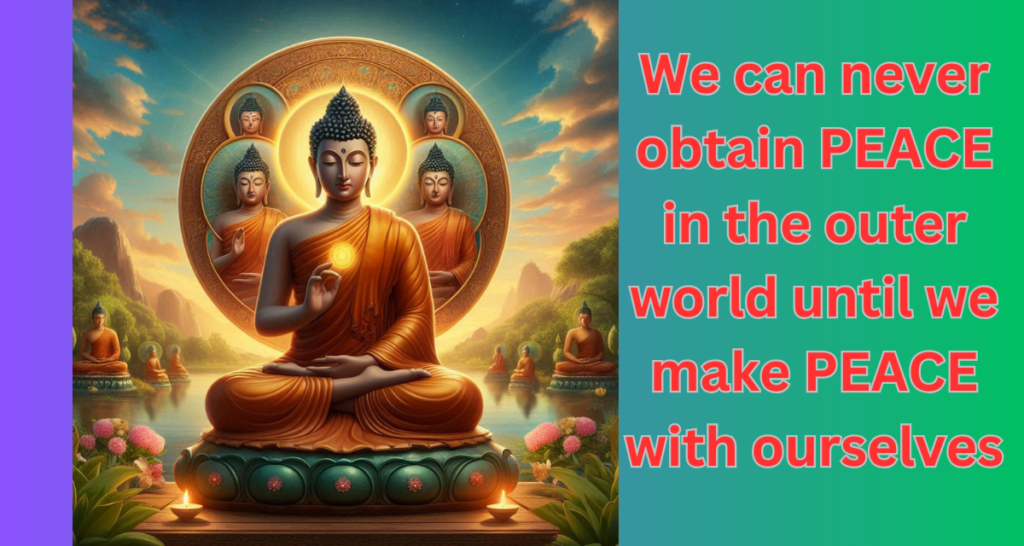Introduction
| Section | Content |
| Overview | Discovering tranquility through Buddha’s wisdom and teachings. |
According to Buddha, how can one attain Peace of mind, It emphasizes that inner peace can be found only through mindfulness, self-awareness, and the practice of the Noble Eightfold Path. Developing qualities of compassion, right action, and meditation allows one to transcend suffering and attain permanent mental tranquility.

Buddha’s Teachings on Attaining Peace of Mind
| Section | Content |
| 1.Understanding | The Four Noble Truths – Dukkha (suffering) and its nature – The cause of suffering (Tanha – craving) – The cessation of suffering (Nirodha) – The path to the cessation of suffering (Marga) |
| 2.Mindfulness | Embracing the present moment with full awareness – Mindful breathing – Observing thoughts and sensations – Cultivating awareness in daily activities |
| 3.Meditation | Inner exploration for mental calmness – Loving-kindness meditation – Vipassana (insight) meditation – Mindfulness of breath |
| 4.Right Living | Ethical conduct for a harmonious life – Right speech, action, and livelihood – Cultivating compassion and empathy – Detachment from material desires |
The blogpost, According to Buddha, how can one attain Peace of mind, is a detailed description of the following table:-
| Aspect | Key Points |
|---|---|
| Understanding Suffering (Dukkha) | Suffering is inherent to life, and material achievements very often lead to further dissatisfactions. |
| Cause of Suffering (Tanha) | The craving and attachment to material desires drives constant dissatisfaction. It can be helped by a practice of gratitude. |
| Cessation of Suffering (Nirodha) | The attachment to the desires has to be stopped and self-love and compassion has to be practiced to end suffering. |
| Path to Cessation (Marga) | Peace is gained through spiritual activities, mindful living, and ethical conduct. |
| Meditation | It is the meditation practices (including mindfulness and loving-kindness) that cultivate mental calm and assist in the management of stress. |
| Right Livelihood | Ethical living, right speech, actions, and proper livelihood create a proper ground for peaceful life. |
| Practical Application | Injecting mindfulness, meditation, and ethics into everyday life revolutionizes the journey toward inner peace and contentment. |
Dukkha and its nature
Dukkha means sadness. We are sad about something in our life. It is said that no one fully attained happiness and contentment in their lives. Even after achieving so many things and satisfying material desires, having comforts and riches there is always a feeling of not having something or the other.
Rich kingdoms of leaders and rulers who have all the fame and riches of worldly needs, there is bound to be some kind of unhappiness about not achieving or having something which he should have. The Great Alexander who achieved everything and was conquering the world couldn’t conquer Indian Land completely before his defeat.
Making an effort to achieve whatever we want to is in our hands. But when we achieve it we want to achieve more because we become unhappy about it.

The Cause of Suffering(Tanha-craving)
After achieving something we fall alone because the world desires us to achieve more. It can be wealth or any of the material needs. This constant unhappiness makes us achieve more and more in our lives to make our living comfortable. It is the driving force to our success.
But one should not crave for it like anything. It is just a material need. Things will take care of them even if we do not achieve something. One should always thank the things we have and always thank almighty for it. This brings peace to our minds.

The Cessation of suffering
One should realize that once we start loving ourselves(self love) and always practice thankfulness, we can halt our sufferings. The fact is that a man looking at others about having something which he doesn’t have crave for having it. One should realize and practice compassion on the one who doesn’t have something which we have.

The path to the cessation of suffering(Nirodha)
Spiritual activities and detachment from worldly desires makes us feel peaceful and happy. The act of giving should always be followed. Remember the givers are the most happiest people. Providing a helping hand to the needy makes us always happy.
Practicing it makes our lives much more simpler and our sufferings or unhappiness halts for at least a while. One should live in the present moment without worrying about the future. It depends on the individual how he perceives his past, present and looks at his future.
Intelligent people live in the present moment, learn from their pasts and secure their future. their every step is a positive one which builds a scope for their future. Being aware about the present needs and exercising the a positive achievement for their future is necessary. One should carry out mindful breathing techniques and a positive energy in daily activities.
For example, it is important to know what is happening around in your country, state, city or region and also what is happening around in the world. The challenges that everyone faces in daily lives should be executed looking too much into the future.
Remember every moment of happiness is a moment to cherish and rejoice. One should always spend some time with himself detaching detaching from the worldly needs. this will help the individual in the long run.
Socializing with experienced individuals who have been working for years, your parents, your relatives, friends, professionals at work, people living in your areas will help your individuality grow and prosper happiness.
Always learn to mind your words. A positive word somewhere can change the whole life of someone. The path to success delves in positive thoughts and sensations.
Meditation
Every individual wants to live a successful, productive and a happy life. Worldly needs have become a cause of our happiness and well being. But more important during the growth stage of our lives, one should learn the art of calmness.
As an individual grows he faces a number of challenges and accomplishing them becomes a need. In this process he needs to take a number of important decisions related to his family, finances, career in the right direction for his family’s well being.
One should develop a loving, kind personality. Such personality will spread joy whoever he meets. One should not allow negative thoughts, jealousy, mind games, greed or a feel less blessed to his purpose in his life.
Practicing calmness, insightful meditation and performing mindful breathing during the times of pressures and unpeaceful atmospheres at workplace or any other social gathering will help you speak the right words and at the right time. This can change the life of any individual who is facing tough time. He can even spend a happy life marking your words. Always be hopeful in negative situation.

Right Living
A harmonious life lies in the personality of a person who has changed the functioning of other’s lives. At workplace typically speaking with mindfulness, inspiring and involving in a right speech with their colleagues makes way for the correct action for not only yourself but also other’s livelihood.
Building a strong relationship with your colleagues, friends, family and people at social events makes yourself not only happy but feel blessed. One should not engage in any kind of negative behavior with anyone. The livelihood that we earn performing the activities throughout the day should bring self satisfaction and compassion in our lives.
Meditating, exercising, appreciating good things and having a feeling of empathy towards all will help our personality grow fruitfully. During the weekends or during times of vacations one should detach from material desires and spend quality time with family and loved ones.
Remember every role in a person’s life is important and one should execute it being grateful and harmonious.
Peace of mind Quotes by Buddha
- “Peace comes from within. Do not seek it without.”
- “Do not dwell in the past, do not dream of the future, concentrate the mind on the present moment.”
- “To understand everything is to forgive everything.”
- “The mind is everything. What you think you become.”
A Journey to Peace: A Story Based on Buddha’s Teachings
| Section | Content |
| Setting the Stage | Meet Sarah, a stressed professional seeking peace in the chaos of daily life. |
| The Encounter | Sarah stumbles upon Buddha’s teachings on peace of mind and decides to explore further. |
| Learning the Path | Sarah starts practicing mindfulness in her daily routine, focusing on the present moment. |
| Inner Exploration | Through meditation, Sarah delves into her thoughts, embracing the impermanence of life. |
| Ethical Living | Sarah adopts ethical living, cultivating kindness and detaching from material desires. |
| Transformation | Gradually, Sarah experiences a profound transformation, finding peace in the simplicity of being. |
Conclusion
| Conclusion: | Content |
| Achieving Harmony | Buddha’s teachings provide a comprehensive guide to attaining peace of mind. By embracing mindfulness, meditation, and ethical living, one can embark on a transformative journey towards inner harmony and tranquility. |
The number of followers of buddha_teachings are 419K.

The references of the above blogpost, According to Buddha, how can one attain Peace of mind, is taken from, EDUMANTRA, LEARN TO GROW, How according to Budha can one obtain peace of mind? | First Flight | Class 10.
Unveiling Excellence: Which awards are presented during the republic day parade?
Q1: What did Buddha teach about attaining peace of mind?
A: Buddha emphasized mindfulness, detachment from desires, compassion, and meditation as key practices for inner peace.
Q2: How does mindfulness help in achieving peace?
A: Mindfulness helps in staying present, reducing anxiety, and eliminating unnecessary mental clutter, leading to a calm mind.
Q3: What is the role of meditation in inner peace?
A: Meditation calms the mind, enhances self-awareness, and helps in overcoming negative emotions like anger and attachment.
Q4: Why does Buddha emphasize detachment for mental peace?
A: Attachment leads to suffering; by letting go of desires and expectations, one can experience true peace and contentment.
Q5: Can practicing compassion bring peace of mind?
A: Yes, being compassionate reduces negative emotions and fosters a sense of connection and fulfillment.
Q6: What is the Noble Eightfold Path, and how does it contribute to peace?
A: It is a set of ethical and mental disciplines—right view, intention, speech, action, livelihood, effort, mindfulness, and concentration—that guide individuals toward enlightenment and inner peace.
Q7: How can one practice detachment in daily life?
A: By reducing dependence on material things, practicing gratitude, and accepting impermanence.
Q8: Does Buddhism require renouncing worldly life for peace?
A: No, peace can be attained while living a balanced life by incorporating mindfulness, compassion, and wisdom.
Q9: How does Buddha’s concept of suffering (Dukkha) relate to peace?
A: Understanding suffering and its causes (desires, ignorance) helps in overcoming distress and finding inner tranquility.
Q10: Can anyone achieve peace of mind through Buddha’s teachings?
A: Yes, anyone who follows the path of mindfulness, compassion, and wisdom can attain inner peace, regardless of background.

